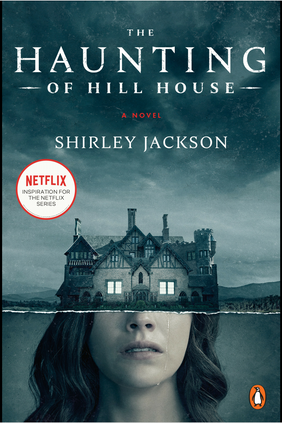 One of the most effective devices that Shirley Jackson employed in her novel The Haunting of Hill House, published in 1959, was ambiguity and vagueness. Leaving juicy details out. Giving incomplete explanations. Keeping all relationships slightly off-balance. As a reader I found this frustrating, even as it pushed me to turn the pages. The ambiguity begins with Eleanor, the central character. Eleanor is a timid and mousy young woman who is prone to fanciful thinking. She doesn’t seem to be entirely grounded in reality. We’re fed crumbs about her life before she joins the summer party at Hill House, but those crumbs in our own imaginations form all sorts of pictures, depending on the reader. The concrete details are that Eleanor, aged 32, cared for her elderly mother until her mother passed in the night (and Eleanor isn’t sure if she ignored her mother’s pleas for help or not on that fateful night—was Eleanor’s inattentiveness the reason her mother passed?). We know that this role of caregiving went on for 11 years and that Eleanor felt trapped and lonely in that role and was glad when her mother died, just three months before the story began. The ambiguity lies in these details. We don’t know why caring for her mother was so dreadful or lonely. Was her mother a stroke victim with no sense left? Or was she a bitter old woman, sniping at her daughter’s self-esteem at every turn? Was there no one in the family who would take over to give Eleanor a break from time to time? One might look at this background and think Eleanor was an upstanding young woman, but on another face the specter of potential elder abuse arises. One of the more startling scenes in the book to me was a scene where Eleanor and Luke are spending time together alone. He makes a comment that he “never had a mother,” which sets Eleanor off in on internal rage. She rants inside her head about how selfish and vain he is—when she had just asked him, essentially, to tell her something about himself that went beyond the surface. I really didn’t understand this response at all. I re-read the scene several times and came to the conclusion that either one of two things was happening in that scene. Either Eleanor is more self-centered and vain herself than I had realized thus far—and just wanted to talk about herself, which Luke failed to realize. Or—and I think this is more likely—the house is already starting to influence her thoughts. After all, one of the most likely ghosts haunting Hill House would be that of one (or both) of the daughters of the original designer/builder/owner. We know that their mother passed away when they were very young and thus speaking of such a thing in her (or their) presence could very well be maddening, which influenced Eleanor’s mental state. Eleanor had already been speaking internally of feeling a connection to the house by that point. At the end of the scene Luke says, “You were so lucky. You had a mother,” which once again raises the ambiguity of what Eleanor’s life with her mother was truly like and whether she felt lucky about that at all. Just two scenes later, Theodora is teasing Eleanor about her interest in Luke and bringing up the lies (that prescient Theodora easily sussed out) Eleanor has told about her life. Eleanor reacts with internal dialogue, feeling remorse for the lie and calling herself a fool. She runs out of the house. Theodora follows and they end up encountering something in the woods. A scene of a happy family playing with a puppy in the clearing that must have morphed into something else—something so horrible that Theo screams and says, “Don’t look back,” she cried out in a voice high with fear, “don’t look back—don’t look—run!” And whatever Theo saw when she looked back is left entirely to our imaginations. There’s more ambiguity when, later, after the two incidents of writing on the wall in chalk and blood, Eleanor begins to have hateful inner dialogue about the people around her. About Theo she thinks, “I hate her, she sickens me,” and “I would like to watch her dying.” These sentiments seem a bit extreme considering the little squabbles they’ve had thus far—and then there’s the connection with Eleanor’s mother’s death. Saying that you’d like to watch someone die is not a sentiment many people might express. I came to the conclusion that the house was influencing her thoughts and feelings by that point. Another reader might interpret it differently. And then Eleanor says, reacting to the words in chalk on the wall: “Look. There’s only one of me, and it’s all I’ve got. I hate seeing myself dissolve and slip and separate so that I’m living in one half, my mind, and I see the other half of me helpless and frantic and driven and I can’t stop it, but I know I’m not really going to be hurt and yet time is so long and even a second goes on and on and I could stand any of it if I could only surrender—” And the clue that the house is truly trying to pull her in somehow is finally revealed. She doesn’t even realize she said it. And Luke and the doctor note that she’s done things like that before. It becomes more and more clear as the novel proceeds toward the climactic ending that Eleanor is being changed by the house, mentally. That perhaps sometimes she is even channeling the spirits of the house. These questions, vagueness, and ambiguities only create more tension, more questions, in the story. The reader is left wondering about so many details. Was there sexual tension between Eleanor and Theo? Were they both jealous of each other’s time alone with Luke? What happened between Eleanor and her mother? And finally... how did Hill House get inside Eleanor’s head?
3 Comments
1/29/2022 05:03:21 am
A nice analysis of the ambiguities here, Jen. The sheer number of them made the story less satisfying for me. And the scene with Luke also puzzled me. First of all because I didn't find Eleanor's statement about her attraction to him or him to her convincing at all. Whether it was true or imagined on her part, there wasn't enough (any?) evidence heretofore to provide a basis for this scene as a conclusion. It seemed petty of her to ask him to tell her something deep about his life and then judge and dismiss him because he shared he had no mother. That scene sticks out in my mind as a primary weakness in the story.
Reply
Michelle Skeen
1/31/2022 01:05:38 pm
Jen- Ambiguity is a trigger (sorry for the use of this overused term) for everyone. In the case of The Haunting of Hill House, I wonder if Jackson wanted the reader to experience what Eleanor was experiencing--the ambiguity and uncertainty throughout the novel. How do we fill those gaps in information. I'm assuming that everyone in our RIG is psychologically stable and yet we are still bothered by the gaps in information. Then look at Eleanor, who is psychologically unstable and imagine the effect of ambiguity on her...ultimately it drove her to suicide.
Reply
Leave a Reply. |
Jennifer Foehner WellsI'm an author of the space-opera variety. Archives
April 2022
Categories |

